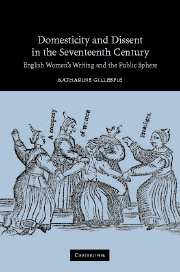Book contents
- Frontmatter
- Contents
- Acknowledgments
- Introduction: Sabrina versus the state
- 1 “Born of the mother's seed”: liberalism, feminism, and religious separatism
- 2 A hammer in her hand: Katherine Chidley and Anna Trapnel separate church from state
- 3 Cure for a diseased head: divorce and contract in the prophecies of Elizabeth Poole
- 4 The unquenchable smoking flax: Sarah Wight, Anne Wentworth, and the “rise” of the sovereign individual
- 5 Improving God's estate: pastoral servitude and the free market in the writings of Mary Cary
- Conclusion
- Index
5 - Improving God's estate: pastoral servitude and the free market in the writings of Mary Cary
Published online by Cambridge University Press: 22 September 2009
- Frontmatter
- Contents
- Acknowledgments
- Introduction: Sabrina versus the state
- 1 “Born of the mother's seed”: liberalism, feminism, and religious separatism
- 2 A hammer in her hand: Katherine Chidley and Anna Trapnel separate church from state
- 3 Cure for a diseased head: divorce and contract in the prophecies of Elizabeth Poole
- 4 The unquenchable smoking flax: Sarah Wight, Anne Wentworth, and the “rise” of the sovereign individual
- 5 Improving God's estate: pastoral servitude and the free market in the writings of Mary Cary
- Conclusion
- Index
Summary
Alas good ventrous youth,
I love thy courage yet, and bold Empris,
But here thy sword can do thee little stead,
Farr other arms, and weapons must
Be those that quell the might of hellish charms,
He with his bare wand can unthred thy joints,
And crumble all thy sinews.
Comus (The Attendant Spirit habited like a Shepherd)And thus by their praiers, and by the word of their Testimony, Saints doe smite the earth
Mary Cary, Resurrection of the WitnessAnd as the winde bloweth where it listeth, though we see it not, so doth the spirit and God hath not tyed himself to give out his spirit to such particular men, and to no others, but to whom he pleases. He did not tie up the spirit of Prophesie in Law, neither to the Priests and Levites, nor the Prophets, nor the sons of the Prophets; but gave out of that spirit to Amos a Heards-man, and to others
Mary Cary, A Word in Season to the Kingdome of EnglandThe issue of toleration impinged upon the economic sphere of seventeenth-century England. Because the established church was underwritten by tithes, those who favored the separation of church from state often waged their battles through the language of property rights, asking such questions as who was and was not “entitled” by God to engage in the “labor” of ministering, and who was and was not obligated to pay for this service?
- Type
- Chapter
- Information
- Domesticity and Dissent in the Seventeenth CenturyEnglish Women Writers and the Public Sphere, pp. 215 - 261Publisher: Cambridge University PressPrint publication year: 2004



